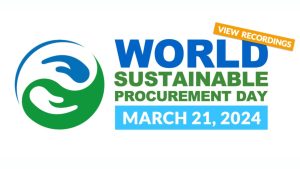 Johannesburg business consultant, Dumi Jere, points out in Part 1 of two articles that the procurement space has enormous power in the fight against climate change, and advises us not to miss the Green boat.
Johannesburg business consultant, Dumi Jere, points out in Part 1 of two articles that the procurement space has enormous power in the fight against climate change, and advises us not to miss the Green boat.
Early last year, I became a verified member of Leaders For Climate Action. At its core, this not-for-profit organisation is a global community of start-up founders united by the will to counter the climate crisis through their own actions.
Let’s face it, climate change is threatening the existence of human life on this planet. Mankind has been ignoring the problem for far too long. I joined this organisation because I realised that we have to start acting on our own and use our influence and network to make a contribution in fighting climate change and caring for our environment.
An area that is intertwined in the seriousness of climate change is green procurement. A report by the Inter-American Development Bank described Green Procurement as “the acquisition of goods, works, services or consultancies whose results have the least possible harmful effects on the environment, human health and safety when compared to other competing and similar acquisitions or those that make a positive impact on the environment.”
You see, green procurement compares price, technology, quality and the environmental impact of the product, service or contract. Its policies are applicable to all organisations, regardless of size. The programmes may be as simple as purchasing renewable energy or recycled office paper or more involved, such as setting environmental requirements for suppliers and contractors.
The beauty of “green” products or services is that they utilise fewer resources, last longer and minimise their impact on the environment. True, some of these products or services have a higher initial outlay, but the resultant savings are helpful in the long run.
Notwithstanding the high initial costs, green procurement policies and programmes can reduce expenditure and waste; increase resource efficiency; and influence production, markets, prices, available services and organisational behaviour. They also assist countries in meeting multilateral requirements such as the Kyoto Protocol and Rotterdam Convention.
Are there any examples of some companies that have such procurement policies in place? Most certainly! Let us consider three examples.
Swedish-founded, Dutch-headquartered multinational conglomerate, Ikea, designs and sells ready-to-assemble furniture. The company has implemented a code of conduct for its suppliers which focuses on environmental impact and health and safety in its working conditions. An external body verifies information submitted by suppliers, which, if they do not meet the code, are requested to remedy the situation. In the event that suppliers continually breach the code, they risk being removed from Ikea’s suppliers list.
The code includes a list of non-negotiables, for example waste and emission reductions, handling, storage and disposal of hazardous chemicals and recycling, to name a few. The code also stipulates that suppliers do not use chemical compounds and substances restricted by Ikea. It even goes so far as requiring suppliers to outline their source of wood and associated processes.
Closer to home, I was pleasantly surprised when I noticed the labelling on a Woolworths fish package, which read: ‘FISHING FOR THE FUTURE: Support our journey toward sustainable seafood.’ This made me curious and I immediately went to their website to read more. There I found this note:
“Given the importance of fish as a vital source of protein for billions of people, the state of the ocean’s fish stocks and marine ecosystems is a worldwide concern. Woolworths has shared this concern for a number of years. We’re therefore committed to procuring all our seafood from sustainable fisheries and responsible farming operations and are also working with local and international seafood sustainability awareness and certification programmes … to ensure that all our seafood is responsibly sourced and traceable back to the ship that caught it or the farm that raised it.”
At our management consultancy, Talanta.co we strive to incorporate green policies too. As a remote first consultancy, we have kept travel to client offices at an absolute minimum, in the process reducing carbon emissions. Thus, when clients engage us and procure our services, they are also, directly or indirectly, implementing green procurement.
Every day we make choices that affect the environment and it is important to consider the environmental impact of these decisions. There is no denying that food scarcity, global warming and the effects the population has on the earth can be mainly attributed to industry. Sustainable procurement allows industries and organisations to lead in reversing this damage. It shows that organisations are aware of future impacts and consider them when making purchasing decisions.
Look out for part of this article which will focus on the 1.5°C Supply Chain Leaders Initiative.
By Dumi K. Jere, ACA, Managing Partner, Talanta



























